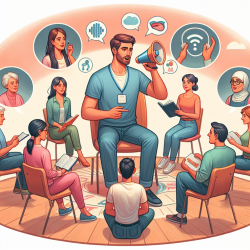As a practitioner in the field of speech therapy, understanding the dynamics of self-help groups and the perceptions of clients who stutter can significantly enhance the effectiveness of treatment methods and improve client outcomes. Drawing insights from the research article "Self-Help Groups and Client Perception" by J. Carlisle, this blog explores the roles of self-help groups in the treatment of stuttering and offers practical advice for practitioners to incorporate these insights into their practice or encourage further research.
Historically, the perception of speech therapists and the effectiveness of speech therapy have evolved significantly. In the late 19th and early 20th centuries, many people with severe stutters faced despair and skepticism towards therapy, largely due to ineffective treatments and a lack of scientific basis for therapeutic methods. The introduction of stuttering modification therapies in the mid-20th century began to change this perception, humanizing speech therapy and fostering a more positive image among clients.
Despite these advances, maintaining improvements outside the clinical setting remains a challenge. This is where self-help groups have played a pivotal role, offering support and maintenance exercises that extend the benefits of clinical therapy. These groups, proliferating at a bewildering rate, have become an essential component of the speech therapy landscape, providing facilities for maintenance exercises and forming an extramural component of clinical treatment.
For practitioners, understanding the value and functions of these self-help groups can be transformative. Here are several ways practitioners can leverage the insights from self-help groups to enhance their skills and improve client outcomes:
- Encourage Participation in Self-Help Groups: Actively encourage clients to join self-help groups as part of their treatment plan. These groups offer social support, maintenance exercises, and a sense of community that can significantly aid in the post-treatment phase.
- Incorporate Group Insights into Therapy: Engage with self-help groups to understand the common challenges and strategies that have proven effective for members. This information can inform therapeutic approaches and tailor therapy to better meet clients' needs.
- Facilitate the Formation of Self-Help Groups: If local self-help groups are not available, consider facilitating the formation of new groups. Providing a space for clients to support each other can extend the impact of therapy beyond the clinical setting.
- Engage in Continuous Learning: Self-help groups offer a wealth of knowledge and experience. Practitioners can benefit from attending meetings, engaging with group leaders, and staying informed about the latest strategies and insights that emerge from these communities.
- Promote a Holistic Approach: Recognize that the journey to overcoming stuttering involves more than just speech therapy. It includes building confidence, social skills, and coping mechanisms. Self-help groups play a crucial role in this holistic approach to treatment.
Self-help groups offer a unique perspective on the challenges and successes encountered by individuals who stutter. By incorporating the insights gained from these groups into clinical practice, practitioners can enhance their therapeutic approaches, making them more client-centered and effective. Moreover, advocating for and supporting the role of self-help groups in the treatment process can lead to better outcomes for clients and a more comprehensive approach to stuttering treatment.
It's clear that self-help groups and professional therapy are not mutually exclusive but are complementary components of a successful stuttering treatment plan. By embracing the insights and support these groups offer, practitioners can enhance their skills, improve client perceptions, and achieve more lasting and meaningful outcomes.
To read the original research paper, please follow this link: Self-Help Groups and Client Perception.










